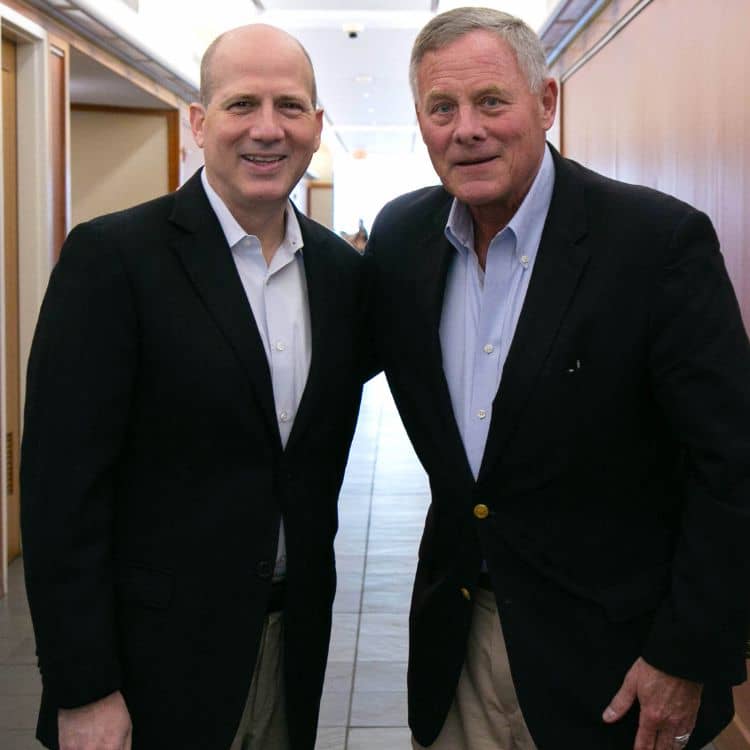Richard Burr retired recently from public service after serving five terms in the U.S. House of Representatives (1995-2005) and three in the U.S. Senate (2005-2023). He came to Duke’s campus to speak to students in Professor Jon Rosenwasser’s Master of National Security Policy course, PubPol 890: Promise and Peril of US Intelligence. While on campus, he spoke with Duke Sanford School of Public Policy Dean Judith Kelley about bipartisanship, political polarization, and the importance of passing down to children and grandchildren the tradition of service.
Conversation Highlights
Responses have been edited for clarity.
On bipartisanship
A member is crazy if they don’t sense what the next generation believes is right. I was fortunate. I had two sons, and there were many times I went to my sons and said, “Where are you guys on this?” I think the first one was a “Don’t Ask, Don’t Tell” policy at D.O.D. [the Department of Defense]. And I shocked a number of my colleagues when I came out in support of doing away with [the policy]. But generationally, I couldn’t ask young men and women to serve, knowing that we were excluding some because of either something they believed or a choice that they made. And it really wasn’t my role to tell that generation, “Here’s what you’ve got to do.”
On political polarization

I think that there’s a political separation that’s further than we’ve ever seen. And I think that’s indicative of the country. And the only difference from this and 20 years ago, is that the right and the left seem to have grown. The middle is diminished, while the middle is still the majority.
And the majority doesn’t seem to control what’s entertainment for the news cycle. It’s only the fringes. It would be refreshing to find an outlet that focused on the middle, because I think the middle would then grow if, in fact, it was reported.
For the upcoming presidential election, I truly hope that the American people have [different] choices than what they’re being presented with right now. I think it’s not representative of the generational mix that exists. I think it doesn’t display the type of global leadership that the world needs right now.
On the importance of democratic participation
It disturbs me when I get an Iraqi ballot that was sent to me by a poll worker in Baghdad — because this was the first election in his lifetime that he had ever gotten to elect his leadership — and I see people dodge bullets to get to a polling place to vote. And then I see Americans that sit at home on their cans and make no attempt. That disturbs me, but it also tells you that we have to increase (in their minds) the value of participation. I’ll never complain about the outcome of an election if 100% of the American people participate.
Why support Ukraine?
If for some reason the West didn’t support [Ukraine’s] independence, it would make me terrified as to what would happen if, in fact, there was a larger incursion. Those [other countries] who we have signed a pact with to come to their aid, [if] we didn’t respond … I think one only needs to look at the history of World War II to understand that had America not finally responded (and we didn’t respond immediately) America might not exist today.
On the importance of involving oneself in service
Involvement is really a requirement. Whether that’s to run for office, whether it’s to commit yourself to a nonprofit, whether it’s to serve in our military or intelligence community — all of these roles are extremely important. Not everybody has aspirations to work for a tech company … We need those folks involved in all facets of American society, economy, but more importantly communities.
Martin Luther King’s last sermon in Washington was titled “Are You Going to Sleep Through the Revolution?” I can’t remember exactly how he phrased it, but [he said] if you’re not as concerned with your neighbor’s children as you are with your own children, you’ll wake up in a community you don’t recognize.
I think Dr. King told us, generationally things are going to change. But foundationally, we have a responsibility to show by example why our community’s fabric was so strong.
When you look at the last 40 years, we became too focused on ourselves. As individuals, and as family units, and not as concerned about those who struggled around us. This is not an advocacy for a larger role for the federal government. The federal government is not going to solve this. We’ve been trying to solve poverty since 1965. We spent more money than we ever dreamed of spending. It’s when communities take on the responsibility to play some role in this…it’s putting your shoulder to the wheel and helping make it turn.
[And] talking about this responsibility to give back is really, really important. I think of my oldest son. I remember one day I called home and I said, “I’m coming home early. Why don’t you and I go eat dinner?” And he said, “Well, I can’t.” I said, “What do you mean you can’t?” He said, “Well, I’ve got a board meeting.” I said, “You’re 31 years old. What?? How could you have a board meeting?” He said, “Well, I’m on the United Way board and we’ve got a meeting tonight.” And as disappointed as I was that we weren’t going to have dinner, I walked away and said, “Oh, he learned it. He learned that he’s got to do these things.”So as a parent, that was something that had to transfer – it transferred from my dad to me and it’s transferring to [my sons]. Hopefully they will transfer it to our grandchildren. And Dr. King’s dream doesn’t go away, it gets replicated.


